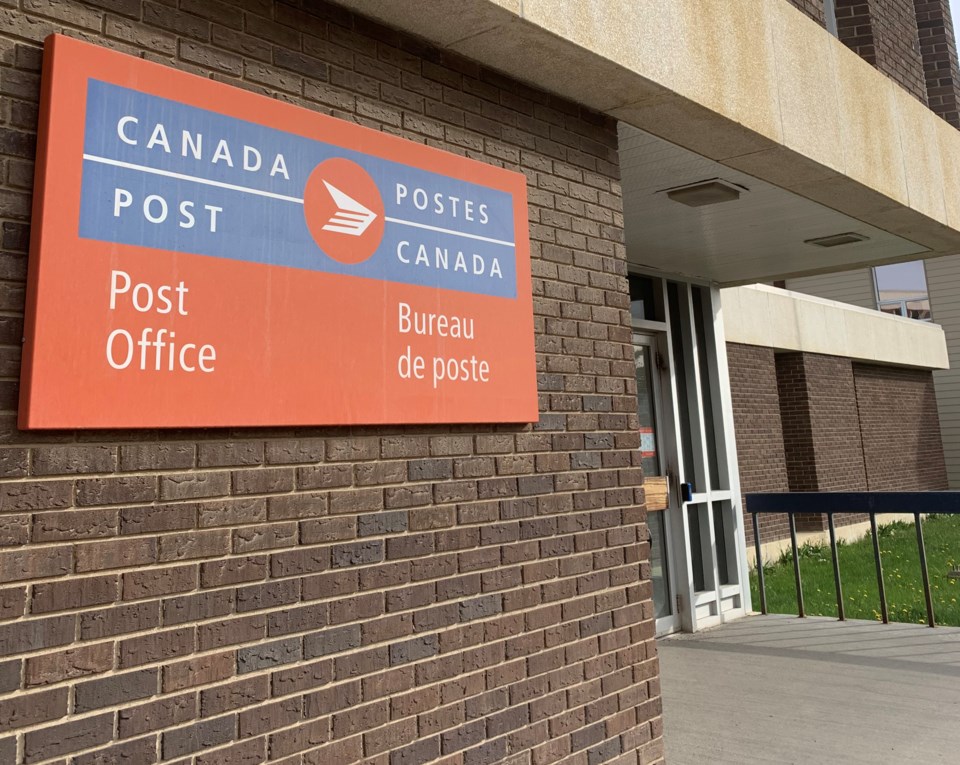WESTLOCK – Imagine a future where Canada Post would be a community hub for Internet service and banking, while offering new services like electric vehicle charging stations.
Those are but a few of the highlights of Delivering Community Power, an ambitious proposal from the Canadian Union of Postal Workers to overhaul Canada Post’s 6,400-plus locations “to create new community hubs while doing so in an environmentally sustainable way.”
Brahm Enslin, CUPW campaign coordinator for the prairie region, presented the vision to Town of Westlock councillors at their May 10 meeting. Enslin said support from municipalities “is crucial” highlighting the fact that the City of Camrose, Beaver County and Brazeau County are some of the 1,000-plus municipalities which have offered support via resolution — council voted 7-0 to accept the presentation as information for the time being.
“It is a big presentation with a lot of information for sure,” noted mayor Ralph Leriger.
Enslin, who spoke to council for just under 15 minutes, believes in the plan calling it ‘win-win-win” but said it will take immense government pressure at all levels to move forward.
“It’s not just for small rural communities, but so much of this is about bringing services back equitably to communities that are underserved in a lot of cases. So the rural communities have a lot to gain from this,” said Enslin.
“This is a vision and it requires pressuring Canada Post to change how our communities are serviced into the future. It creates and sustains jobs, provides new services for people in small, underserved regions, to large urban centres. And the post office will be profitable while being environmentally sustainable.”
The plan has six pillars, starting with transitioning the Canada Post fleet, the largest commercial fleet in the country, to 100 per cent renewable energy and retrofitting all Canada Post buildings to increase energy efficiency.
Bringing back a postal bank (a service Canada Post offered for 100 years before it was terminated in 1968) is also key, said Enslin, who pointed out that 1,200-plus communities with post offices don’t have banks or credit unions, while only 54 out of 615 First Nations have banks.
“These are not new services either; in fact, many countries have a postal bank, and therefore a post office, that is profitable. We know it will work as France’s postal bank made $1.1 billion Euros in 2017,” he stated.
The plan also envisions post offices becoming community and digital access hubs that would allow entrepreneurs to use them as meeting spaces or pop-up shops to connect with customers. Post offices, the proposal goes on to state, could help bring affordable Internet access, and digital training and support to the 3.4 million Canadians who lack it.
“High speed Internet has become an essential service and is akin to electricity or the railroad of the 21st century,” said Enslin.
Finally, the proposal looks to expand door-door service and create “check-in” services to support seniors, people with disabilities and others who need some support to live independently in their homes.
Coun. Clem Fagnan told Enslin he liked much of what he heard, while Coun. John Shoemaker said he was interested, but wanted to know how much it will cost.
“It’s not going to cost the taxpayers anything, especially as an investment,” said Enslin, noting they would seek government grants for much of the infrastructure work. “And it’s supposed to be self-sustaining, if not profitable with postal banking.”
Fagnan also went on to note the loss of the post offices in Dapp and Vimy, which Enslin said they’ve fought against.
“Unions are criticized for saying there are problems, but not necessarily having solutions. This is a solution-driven plan,” said Enslin. “It’s a plan to create not only revenue, but jobs and services and combat the thought that we need to cut Canada Post. And maybe the public can get behind it and say this is what we need to see out of our post office and it is a cherished institution and we don’t need to cut it.”
In Athabasca, during the May 4 council meeting, councillors reviewed a letter on the same subject from Enslin, and while mayor Colleen Powell was interested in the idea of a postal bank as she had seen in Europe, overall, council seemed less receptive to the idea.
“I'm very hesitant to back this whole project because I think first of all federal government doesn't need to be involved in this whatsoever, so I can see this being a huge money grabbed by the union to try to change a mandate so that they can become more powerful,” said Coun. Dave Pacholok.
A motion to support the proposal and write a letter to the minister in charge failed with a 3-3 tie vote.



